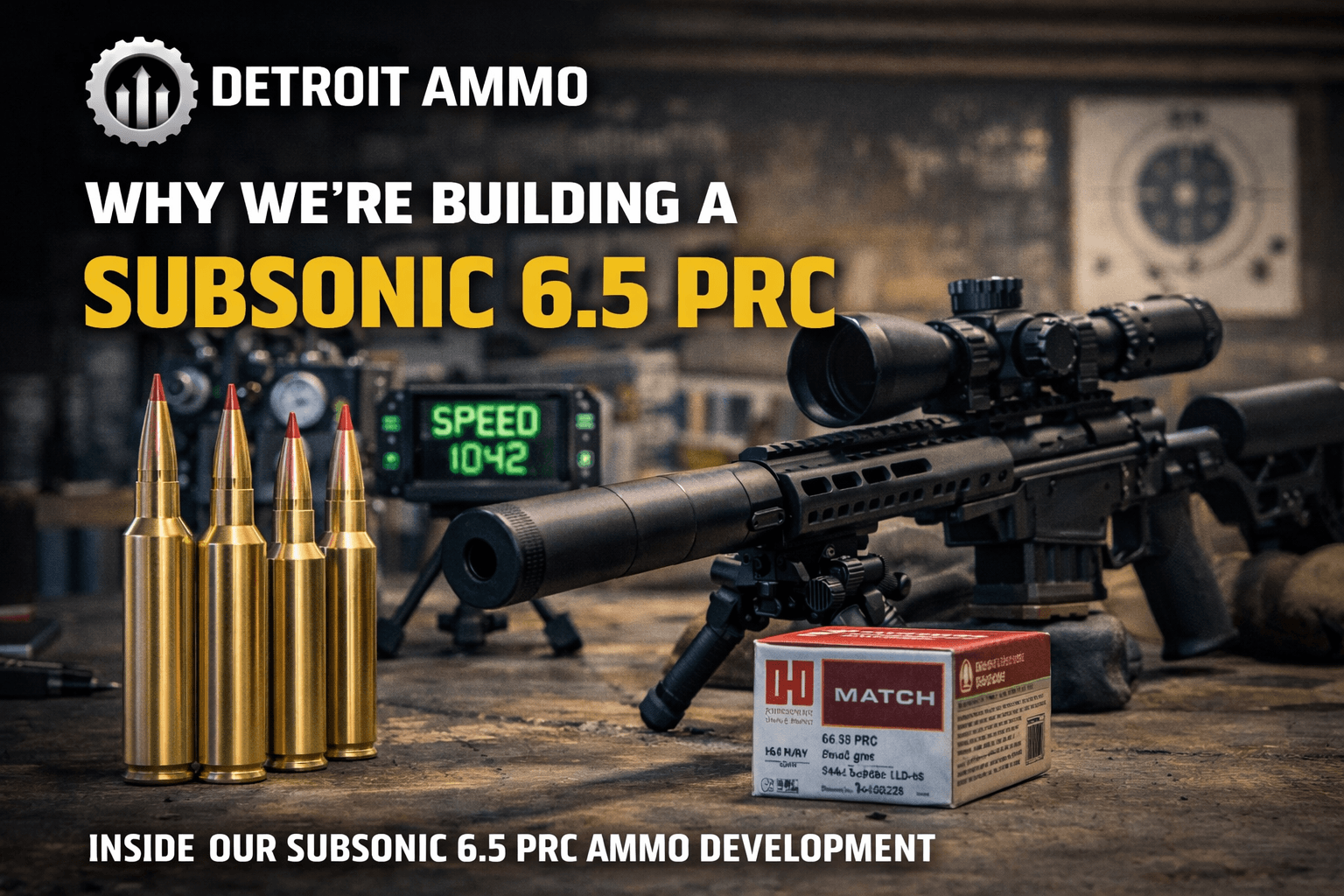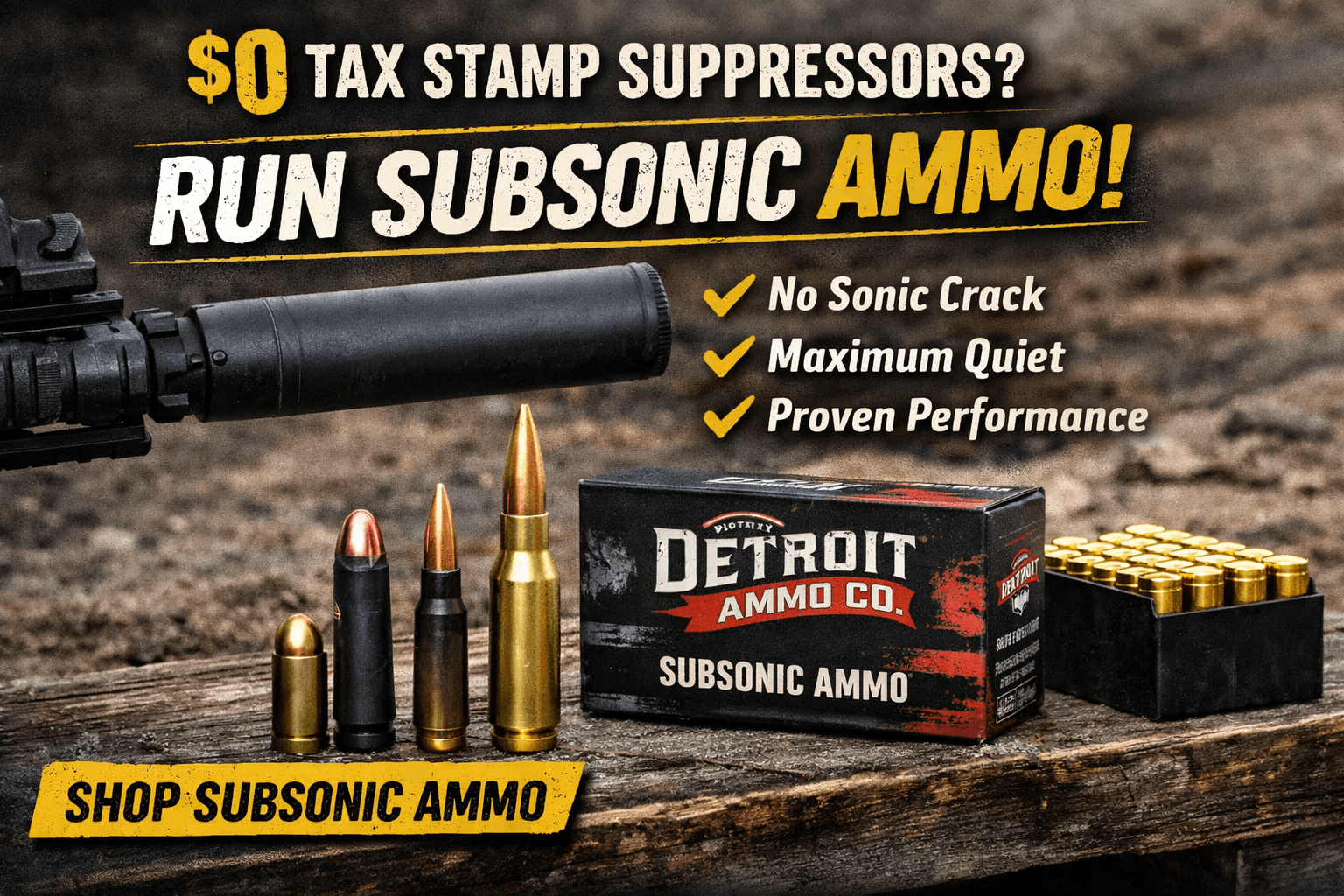Suppressors in 2025: Deregulation Efforts and What It Means for You
Posted May 22, 2025
In a significant shift in firearm legislation, 2025 is shaping up to be a landmark year for suppressor (or "silencer") ownership in the United States. With two major pieces of legislation moving through Congress — the "One Big Beautiful Bill Act" and the "SHUSH Act" — gun owners may soon experience one of the most substantial deregulatory moves in modern firearms history. At Detroit Ammunition Company, we're breaking down what these changes mean, why they matter, and how they could affect gun owners here in Michigan and across the country.
A Brief History of Suppressor Regulation
Since the passage of the National Firearms Act (NFA) in 1934, suppressors have been regulated under federal law as restricted items. Despite being non-lethal accessories that reduce sound signatures and muzzle flash, suppressors have long been treated with the same scrutiny as machine guns. Acquiring one has historically required a $200 tax stamp, extensive paperwork, fingerprinting, background checks, and months of waiting.
Supporters of suppressor deregulation argue that these requirements are outdated, especially considering the widespread civilian use of suppressors in countries like New Zealand, Norway, and Finland — where they are seen as tools for hearing protection and courtesy rather than items of suspicion.
The One Big Beautiful Bill Act: What It Does
The "One Big Beautiful Bill Act," introduced with support from Second Amendment proponents in the House, includes a major clause: the complete removal of suppressors from the NFA. This would eliminate the $200 tax stamp, the federal registry, and the ATF's bureaucratic approval process. In effect, suppressors would be treated the same as any other firearm accessory.
Proponents argue this move restores constitutionally protected rights while enhancing public health. Hunters, competition shooters, and casual range-goers could all benefit from reduced sound exposure without the barriers of federal registration.
Critics, on the other hand, express concern over increased criminal misuse. However, data from the Bureau of Alcohol, Tobacco, Firearms and Explosives (ATF) shows that legally owned suppressors are almost never used in crimes. Of the more than 2.6 million suppressors currently registered in the U.S., a 2017 report showed fewer than 0.003% were associated with any criminal activity.
The SHUSH Act: Taking It One Step Further
Short for "Silencers Helping Us Save Hearing," the SHUSH Act, sponsored by Senator Mike Lee and Representative Michael Cloud, goes even further than the Big Beautiful Bill. It removes suppressors not only from the NFA but also from the Gun Control Act of 1968 altogether. That means no federal oversight whatsoever: no background check, no ATF paperwork, and no restriction on interstate sales.
This would mark an unprecedented shift in federal firearms policy. Supporters say it rightly classifies suppressors as what they truly are — non-lethal safety devices. Opponents, however, fear the lack of oversight could result in abuse, despite data suggesting the opposite.
What This Means for Michigan Gun Owners
Here in Michigan, suppressors are legal to own and use for hunting and recreational shooting. The primary barrier for most residents is the federal process and the cost associated with NFA compliance. If either of these bills passes, suppressor ownership would become vastly more accessible.
Michigan residents could walk into a licensed dealer and purchase a suppressor just as easily as they would a scope or bipod. No tax stamp. No nine-month wait. Just a standard 4473 background check — or none at all, in the case of the SHUSH Act.
This change would also simplify the legal use of suppressors in the field. Hunters in Michigan who currently avoid suppressors due to red tape might finally find the path clear for safer, quieter shooting.
The Health and Safety Argument
The core argument for deregulation centers around hearing protection. Suppressors typically reduce a firearm's noise by 20 to 35 decibels, which can make the difference between permanent hearing damage and safer shooting. The Centers for Disease Control and Prevention (CDC) has identified firearm noise as a significant cause of hearing loss among hunters and recreational shooters.
Suppressors also minimize recoil and muzzle rise, making them particularly beneficial for newer shooters and those with smaller frames. And contrary to Hollywood's portrayal, suppressors don't make guns "silent" — they make them safer.
Industry Impact and Economic Opportunity
The suppressor industry is already booming. In 2024 alone, suppressor sales increased by 80%, and manufacturers are struggling to meet demand. Deregulation would likely lead to a surge in production, innovation, and jobs.
At Detroit Ammunition Company, we expect increased demand for subsonic ammunition — which is optimized for suppressor use. We're preparing by expanding our subsonic lines in calibers like .223, 9mm, .300 Blackout, and 6.5 Creedmoor. This shift isn't just political; it's a market transformation.
Final Thoughts
The tide is turning. What was once considered fringe legislation is now making real progress on Capitol Hill. Whether or not these bills pass in their current forms, they represent a cultural and political shift in how suppressors are viewed by the public and lawmakers alike.
As always, we encourage our customers to stay informed, get involved, and make their voices heard. Deregulation of suppressors could mean a safer, quieter, and more accessible shooting experience for everyone.
We'll continue to monitor these developments and provide updates. In the meantime, check out our full line of subsonic ammunition and be ready for what could be the most exciting change in firearms legislation in decades.
Stay safe, shoot straight,


